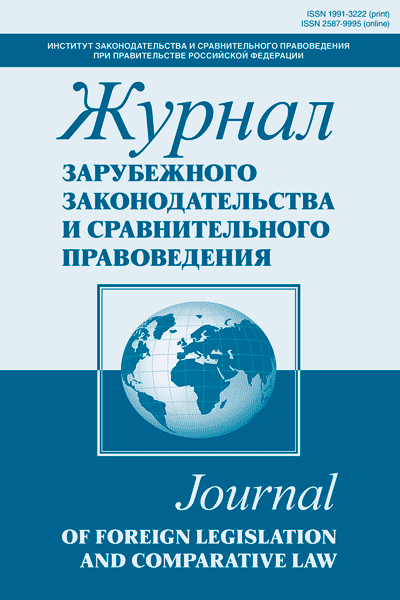The possibility to store sperm and to produce embryos in vitro has made it possible for a child to be conceived after the death of one or even both of the child’s parents and the number of posthumous conceptions has increased in recent decades around the world. Posthumous reproduction raises a complex of legal issues: has someone the right to harvest sperm from a dead man body and to use cryopreserved sperm, embryos or eggs to conceive a child after the death of his (her) genetic parent, can posthumously conceived child have legal tie with such a parent and inherit from his (her) parent? These issues have direct relevance to human rights in the sphere of reproduction and the rights of posthumously conceived child simultaneously. According to foreign law the key questions in determination of parentage are the consent of the deceased person to use postmortem reproduction and his or her consent to be a parent of posthumously conceived child. Traditionally to inherit, a person must be alive at the death of the testator or to be conceived before the death, but this rule has been already changed in 21 states of the USA and the Canadian province of British Columbia, where posthumously conceived children can inherit. However, besides the determination of parentage, there are several other additional conditions of their inheritance rights.
assisted reproductive technology, posthumous conception, parentage, inheritance rights.
1. Deirdre Madden, Medicine, Ethics and the Law. 2nd ed. 2011.
2. Kindregan C. P., McBrien M. Assisted Reproductive Technology: A Lawyer’s Guide to Emerging Law and Science. American Bar Association, 2006.
3. Minor K. Posthumously Conceived Children and Social Security Survivor’s Benefits: Imlications of the Ninth Circuit’s Novel Approach For Determining Eligibility in Gilett-Netting v. Barnhart, 35 Golden Gate U. L. Rev. (2005). URL: http://digitalcommons.law.ggu.edu/cgi/viewcontent.cgi?article=1897&;context=ggulrev.
4. Peart N. Life beyond Death: Regulating Posthumous Reproduction in New Zealand. Victoria University of Wellington. 2015. Vol. 46. No. 3.
5. Peebles A. T. Challenges and Inconsistencies Facing the Posthumously Conceived Child, 79 Mo. L. Rev. (2013). URL: http://scholarship.law.missouri.edu/cgi/viewcontent.cgi?article=4085&;context=mlr.
6. Radigan C. R., Schoenhaar D. R. Statutory Inheritance Rights of a Posthumously Conceived Child. New York Law Journal, January 12. 2015. URL: http://rmfpc.com/wp-content/uploads/2015/01/Statutory-Inheritance-Rights-of-a-Posthumously-Conceived-Child-_-New-York-Law-Journal.pdf.
7. Ravitsky V. Posthumous Reproduction Guidelines in Israel. Hastings Center Report. Vol. 34. Iss. 2, March 2004. URL: http://repository.upenn.edu/cgi/viewcontent.cgi?article=1012&;context=bioethics_papers.
8. Rimon-Greenspan H., Ravitsky V. New Frontiers in Posthumous Reproduction. URL: http://www.bionews.org.uk/page_313450.asp.
9. Rosenblum I. The Biological Willtm - a New Paradigm in ART? URL: http://www.newfamily.org.il/en/4905/the-biologicalwill%E2%84%A2-%E2%80%93-a-new-paradigm-in-art/.
10. Sabatello M. Posthumously Conceived Children: An International and Human Rights Perspective. 27 J. L. & Health. 29 (2014). URL: http://engagedscholarship.csuohio.edu/cgi/viewcontent.cgi?article=1426&;context=jlh.
11. Kirichenko K. A. Sovremennye teorii osnovaniy vozniknoveniya roditel´skikh prav. Semeynoe i zhilishchnoe pravo. 2008. № 6.
12. Malkin O. Yu. Litsa, prizyvaemye k nasledovaniyu po zakonu. Nasledstvennoe pravo. 2014. № 4.
13. Osnovy nasledstvennogo prava Rossii, Germanii, Frantsii / pod obshch. red. E. Yu. Petrova. M., 2015.
14. Pravo pozadi nauki. Novaya advokatskaya gazeta. URL: http://advgazeta.livejournal.com/5215.html.
15. Svitnev K. A. Pravovye i eticheskie aspekty posmertnoy reproduktsii. Pravovye voprosy v zdravookhranenii. 2011. № 6.
16. Sravnitel´noe pravo. Chastnopravovoe regulirovanie imushchestvennogo oborota v raznosistemnykh pravoporyadkakh / pod red. V. V. Bezbakha, V. P. Seregina, T. P. Dan´ko. M., 2009.





